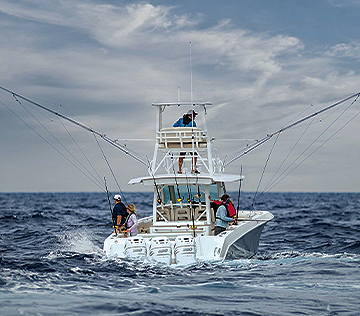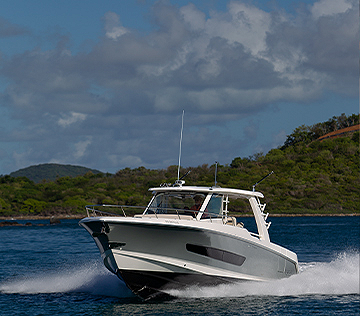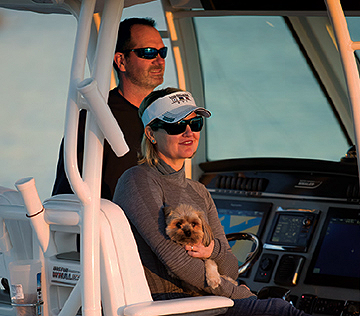
How to leave your boat after every trip
Tips for cleanup and stowage of your Boston Whaler
A fun day on the water starts where the last trip left off so it’s important to care for your boat after every outing and leave it in the best condition possible. The specifics of what to do after each trip will depend on how long you plan to leave the boat and whether it’s stored in the water at a marina or on the trailer at your home or another facility. Let’s look at some of the common factors as well as the differences.
Cleaning
Leaving a clean boat will not only start the next trip right, it will protect your investment while you’re gone. Rinse the boat whether you use it in fresh or salt water. Be sure to get the hull, deck, any pulleys, lockers, canvas enclosures and cushions. Pay special attention to zippers which can freeze up when salty and dirty. Dry all exterior and interior surfaces and wipe down water spots on canvas windows where they can attract dirt and stainless where they’re likely start the process of rust. Clean flooring surfaces of any dirt or fish guts and empty the bilge.
Remove all trash and food which can attract rodents, spoil and start a funk. Take home any dirty laundry and wet gear like towels, lifejackets or water toys. For trailered boats, remove the plug and drain out any water. Some boats have multiple plugs so get them all. Store them somewhere secure and replace them before you launch next time.
Protection and security
If you store your Boston Whaler in a slip, think through how to leave your boat at the marina. Double check the dock lines and fenders. You’ll want your boat secure even if the wind comes up. Lock individual compartments as well as the boat itself if there’s a cabin and turn off any equipment or electronics so you don’t cause an accidental power drain. (This may be done at a main battery switch on some installations.) Leave outboard engines up and out of the water and move exterior cushions inside if possible. Zip or button up any canvas enclosures but provide for ventilation as much as possible.
If you store the boat on a trailer lock individual compartments. Cover the boat to protect it from the elements as well as bird droppings and uninvited guests. Flush the engines if the boat will be stored a while and if you boat in salt water. Make sure the cover provides ventilation to preclude mold and mildew. Check the pressure on the trailer tires and the trailer and light connections before moving the boat. Add a trailer security device such as a tire boot or tongue lock to ensure nobody else moves it.
What not to leave behind on a boat
Besides trash and perishables, you don’t want to leave valuables aboard. If your expensive wakeboard can be stored elsewhere, take it with you. If your electronics are removable, put them below or also take them with you. Your prize fishing gear should be removed or locked in a compartment onboard. Finally, don’t leave excessive amounts of flammables aboard including certain cleaning products or liquids like acetone. Store these in a dock box at the slip or completely off any boat on a trailer.
Regardless whether your Boston Whaler is in a slip or on a trailer, the objective is to leave it salt-free, clean, dry, covered if possible, and locked because the way you leave it is the way you’ll find it when it’s time to go out and have fun again.
--
This is for general information purposes only. Your use or reliance on any of the information in this Blog is solely at your own risk. Under no circumstance will we have any liability for any loss or damage of any kind incurred as a result of the use of any of the information provided.
Options and features mentioned subject to change. Please confirm availability of all accessories and equipment with an authorized Boston Whaler Dealer.



